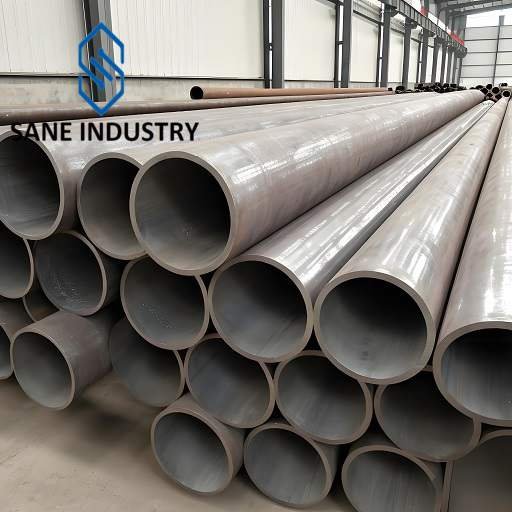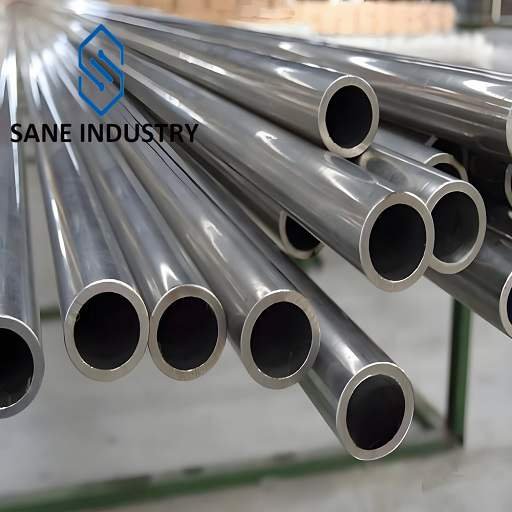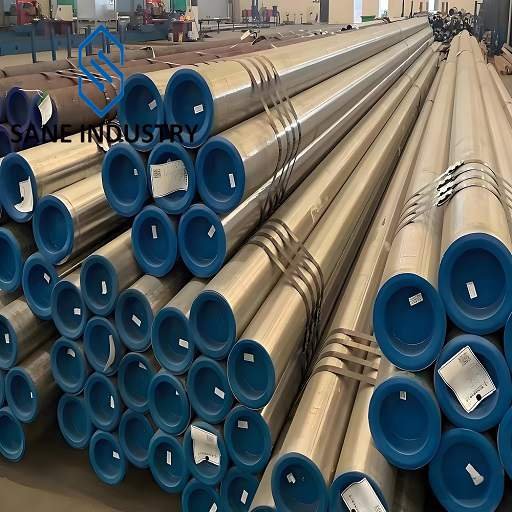What is an Alloy Steel Pipe
An alloy steel pipe is a tubular product manufactured from steel infused with specific alloying elements (e.g., chromium, molybdenum, nickel) to enhance mechanical properties, corrosion resistance, or performance under extreme conditions. Unlike carbon steel pipes, which primarily consist of iron and carbon, alloy steel pipes are engineered for specialized industrial applications where standard materials fail.
Types of Alloy Steel Pipes
- Based on material grades
- Chromium-Molybdenum (Cr-Mo) Steel Pipes (e.g., A335 P5/P9/P11): Chromium (Cr) enhances oxidation resistance; Molybdenum (Mo) improves high-temperature strength.
- Nickel-Based Alloy Pipes (e.g., Inconel 625, Hastelloy C276): Used in extreme environments (e.g., acidic or high-temperature conditions).
- Low-Temperature Alloy Pipes (e.g., A333 Grade 6): Contains elements like nickel to maintain toughness at low temperatures.
- Based on manufacturing process
- seamless carbon steel pipe: ideal for high-pressure applications
- welding carbon steel pipe: ERW carbon steel pipes, LSAW carbon steel pipes, SSAW carbon steel pipes, suitable for low-to-medium pressure uses.
- Based on shape
- alloy steel square pipe
- alloy steel round pipe
What are the advantages of Alloy Steel Pipes
Enhanced Strength:
- Superior tensile/yield strength vs. carbon steel, ideal for high-pressure/high-load applications (e.g., oil & gas, power plants).
Corrosion Resistance:
- Alloying elements (Cr, Ni, Mo) resist oxidation, acids, and H₂S/CO₂ in harsh environments (e.g., sour wells, chemical plants).
Temperature Tolerance:
- Maintain structural integrity at extreme temperatures (–50°C to 600°C); critical for steam lines, refineries, and cryogenic systems.
Durability:
- Fatigue and wear resistance extend lifespan in dynamic/cyclic conditions (e.g., hydraulic systems, mining).
Lightweight Design:
- High strength-to-weight ratio reduces material usage while meeting performance standards (e.g., aerospace, automotive).
Versatility:
- Customizable via heat treatment/alloy adjustments for tailored hardness, weldability, or ductility.
What are the disadvantages of Alloy Steel Pipes
High Cost:
- Expensive alloying elements (e.g., Cr, Ni, Mo) and complex heat treatments raise production costs vs. carbon steel.
Fabrication Challenges:
- Requires specialized welding techniques (pre/post-heating) and machining tools due to hardness.
Limited Corrosion Resistance in Specific Environments:
- Susceptible to pitting/crevice corrosion in chloride-rich settings (e.g., seawater) or stress corrosion cracking in acidic conditions.
Brittleness at Extremely Low Temperatures:
- Some grades may lose toughness in cryogenic applications (<–50°C), risking fractures.
Environmental Impact:
- Energy-intensive production and mining of rare alloy metals increase carbon footprint.
Thermal Expansion Mismatch:
- Differential expansion rates vs. other materials can strain joints in mixed-material systems.
How are Alloy Steel Pipes made
Material Preparation:
- Raw steel (iron, carbon) is melted in electric arc/induction furnaces. Alloying elements (Cr, Ni, Mo) are added to achieve target composition.
Forming:
- Seamless Pipes: Heated steel billets are pierced and rolled via mandrel mills or extrusion.
- Welded Pipes: Steel plates/slabs are rolled into cylindrical shapes and welded (ERW, SAW, or LSAW methods).
Heat Treatment:
- Normalizing, quenching, or tempering optimizes hardness, strength, and corrosion resistance.
Finishing:
- Pipes are straightened, cut, and surface-treated (e.g., shot blasting, galvanizing, or coating).
Testing & Inspection:
- Non-destructive tests (ultrasonic, hydrostatic) and mechanical checks (tensile, hardness) ensure compliance with standards.
Applications of Alloy Steel Pipes
Oil & Gas Industry
- High-pressure pipelines for drilling, refining, and transporting hydrocarbons due to strength and corrosion resistance.
Power Generation
- Boiler systems and steam lines in thermal/coal plants, withstanding extreme temperatures and pressures.
Automotive Manufacturing
- Critical components like fuel injection systems and exhausts, leveraging durability and heat resistance.
Construction & Infrastructure
- Structural supports in bridges, high-rises, and industrial frameworks for load-bearing efficiency.
Chemical Processing
- Corrosion-resistant pipelines for aggressive chemical transport (e.g., acids, solvents).
Mining & Heavy Machinery
- Hydraulic systems and drill pipes designed to endure abrasive environments.
Aerospace
- Lightweight, high-strength tubing for aircraft hydraulic lines and engine components.
Our Alloy Steel Pipe Sizes and Materials
| Outside Diameter | 10.3 to 1500 mm (1/8” to 60” NPS) | |
| Wall Thickness | 1 to 60 mm (0.04” to 2.37”) | |
| Length | Customized | |
| Type of Pipes | Seamless or welded | |
| Type of End | Plain ends, beveled ends | |
| Outside Coating | Natural, 3PE, FBE, etc. | |
| Material Grade | A/SA-213 | T1, T11, T12, T2, T22, T5, T9, T91, T92 |
| A/SA-335 | P1, P11, P12, P2, P22, P5, P9, P91, P92 | |
| A/SA-691 | 1/2CR, 1-1/4CR, 2-1/4CR, 3CR, 5CR, 9CR | |
| Any other | ||
For other customized requirements, please contact us. We can also provide alloy steel tube bending services.
What is the Price of Carbon Steel Pipes
Please contact our sales manager Allen@sanesteel.com
Why Choose Us
- A 16-year alloy steel pipe supplier. We are experts.
- solutions for all your needs
- the highest product quality
- the low lead times
- excellent customer service








